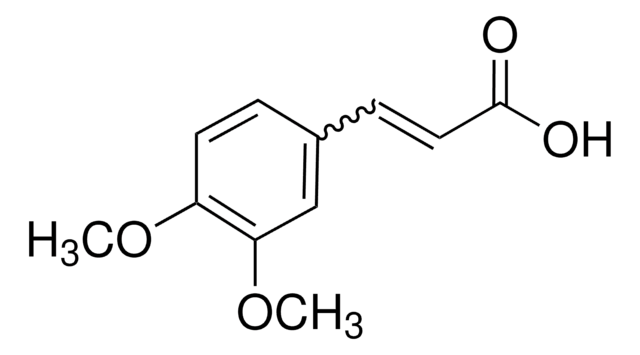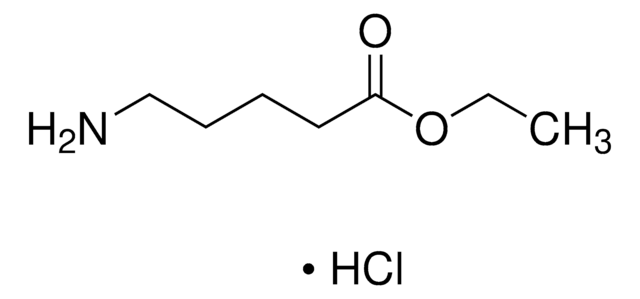D134007
3,5-Dimethoxycinnamic acid, predominantly trans
≥99%
Zaloguj sięWyświetlanie cen organizacyjnych i kontraktowych
About This Item
Wzór liniowy:
(CH3O)2C6H3CH=CHCO2H
Numer CAS:
Masa cząsteczkowa:
208.21
Numer WE:
Numer MDL:
Kod UNSPSC:
12352100
Identyfikator substancji w PubChem:
NACRES:
NA.22
Polecane produkty
Próba
≥99%
Postać
solid
mp
174-175 °C (lit.)
ciąg SMILES
COc1cc(OC)cc(\C=C\C(O)=O)c1
InChI
1S/C11H12O4/c1-14-9-5-8(3-4-11(12)13)6-10(7-9)15-2/h3-7H,1-2H3,(H,12,13)/b4-3+
Klucz InChI
VLSRUFWCGBMYDJ-ONEGZZNKSA-N
Kod klasy składowania
11 - Combustible Solids
Klasa zagrożenia wodnego (WGK)
WGK 3
Temperatura zapłonu (°F)
Not applicable
Temperatura zapłonu (°C)
Not applicable
Środki ochrony indywidualnej
Eyeshields, Gloves, type N95 (US)
Certyfikaty analizy (CoA)
Poszukaj Certyfikaty analizy (CoA), wpisując numer partii/serii produktów. Numery serii i partii można znaleźć na etykiecie produktu po słowach „seria” lub „partia”.
Masz już ten produkt?
Dokumenty związane z niedawno zakupionymi produktami zostały zamieszczone w Bibliotece dokumentów.
Louise C Simms et al.
Pest management science, 58(7), 687-694 (2002-07-31)
Slugs are major pests of oilseed rape that are poorly controlled by conventional bait pellets. A series of laboratory experiments investigated the potential of seed-dressings to control slug damage in this crop. Four compounds: metaldehyde, methiocarb, cinnamamide and 3,5-dimethoxycinnamic acid
T W Rosanske et al.
Journal of pharmaceutical sciences, 69(5), 564-567 (1980-05-01)
The solubility, spectral, and kinetic methods were used to study complexing between alpha-cyclodextrin (ligand, L) and 3,5-dimethoxycinnamic acid, benzalacetone, and methyl cinnamate (substrates, S). In aqueous solution at 25 degrees and with an ionic strength of 0.01 M, the following
Katsunori Teranishi
Luminescence : the journal of biological and chemical luminescence, 32(2), 182-189 (2016-06-09)
Mycena chlorophos is an oxygen-dependent bioluminescent fungus. The mechanisms underlying its light emission are unknown. A component that increased the bioluminescence intensity of the immature living gills of M. chlorophos was isolated from mature M. chlorophos gills and chemically characterized.
Nasz zespół naukowców ma doświadczenie we wszystkich obszarach badań, w tym w naukach przyrodniczych, materiałoznawstwie, syntezie chemicznej, chromatografii, analityce i wielu innych dziedzinach.
Skontaktuj się z zespołem ds. pomocy technicznej








